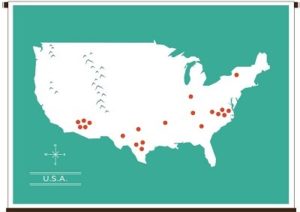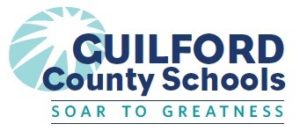By Sharon Kebschull Barrett, April 19, 2018
Under Superintendent Sharon Contreras, Guilford County Schools, based in Greensboro, N.C., has joined the national Opportunity Culture® initiative to extend the reach of excellent teachers and their teams to more students, for more pay, within schools’ recurring budgets.
Researchers at the Brookings Institution and American Institutes for Research released a study in January showing the effect Opportunity Culture® can have: Teachers who were on average at the 50th percentile in student learning gains, and who then joined teams led by multi-classroom leaders, produced learning gains equivalent to those of teachers from the 75th to 85th percentile in math, and, in six of the seven statistical models, from 66th to 72nd percentile in reading.

Opportunity Culture®, founded and led by Public Impact® of Chapel Hill-Carrboro, N.C., now includes more than 20 districts in nine states, including five in North Carolina. Guilford will be the second of North Carolina’s five largest districts to join. See the Opportunity Culture® Dashboard for more details about the initiative, which has grown to more than 225 schools since implementation began in seven schools in 2013.
Contreras was also the superintendent in Syracuse, N.Y., when she took the unprecedented step of becoming the first collective bargaining Opportunity Culture® district in 2014–15, only the third district in the initiative’s pilot phase.
“I have seen what works and doesn’t, and will bring the very best of Opportunity Culture® to the students and teachers of Guilford County,” Contreras said. “The recent study’s results are deeply encouraging, and we will benefit from learning lessons from the early Opportunity Culture® districts to guide our work toward strong outcomes.”
A report produced by a transition team that Contreras convened upon coming to Guilford included a call for timely, job-embedded professional development; opportunities for teachers to lead without leaving the classroom; career pathways that expand the reach of excellent teachers and principals; and competitive teacher and principal salaries to attract and retain top educators. Opportunity Culture® schools address all those aims.
Guilford leaders also expect Opportunity Culture® to help the district meet its new strategic goals by 2022, which include increasing by 50 percent the number of schools that exceed expected growth, and decreasing the achievement gap between black and Latino students and their white peers by 7 percentage points.
“The Public Impact® team is delighted to collaborate with the outstanding community of educators in Guilford County. They are helping to lead the state, not just their own district,” said Bryan Hassel, co-president of Public Impact® and co-founder of the Opportunity Culture® initiative.
Design teams made up of teachers and administrators at the first nine Opportunity Culture® schools are now planning their implementation for the 2018–19 school year: Bessemer Elementary, Cone Elementary, Falkener Elementary, Foust Elementary, Hampton Elementary, Wiley Elementary, Ferndale Middle, Hairston Middle, and Jackson Middle. Guilford plans to add many more schools to the initiative over time.
Students at Hampton Elementary were relocated this week following a tornado on Sunday that damaged the school, so Public Impact® will work with its Opportunity Culture® design team on a modified schedule this spring.

These nine schools are all Title I schools because of their high percentages of economically disadvantaged students. Guilford schools will use the multi-classroom leader role, as well as the teaching role known as expanded-impact teachers and the paraprofessional role known as reach associates. All these roles will receive substantial pay supplements, up to $20,000 in Title I schools for multi-classroom leaders (MCLs). Supplements vary by how much teachers or MCLs are extending their reach and supporting colleagues.
The North Carolina school districts of Charlotte-Mecklenburg, Cabarrus, Edgecombe, and Vance counties are also creating Opportunity Culture®s. Teams from Guilford schools visited Opportunity Culture® schools in Charlotte-Mecklenburg before signing on to the initiative. Principals said they thought Opportunity Culture® would help them recruit teachers and promote outstanding teachers already in the district by offering teacher-leader roles, and improve teacher working conditions in their schools by offering teachers more support to increase student achievement.
Note: Public Impact® and Opportunity Culture® are registered trademarks; Multi-Classroom Leader®, MCL™, Reach Associate™, and Expanded-Impact Teacher™ are trademarked terms, registration pending.
